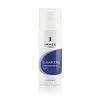What's inside
What's inside
 Key Ingredients
Key Ingredients

 Benefits
Benefits

 Concerns
Concerns

 Ingredients Side-by-side
Ingredients Side-by-side

Benzoyl Peroxide 5%
Water
Skin ConditioningCaprylic/Capric Triglyceride
MaskingOligopeptide-10
AntimicrobialCetearyl Olivate
Syringa Vulgaris Extract
Skin ConditioningChamomilla Recutita Flower Extract
MaskingOryza Sativa Bran Extract
Skin ConditioningSorbitan Olivate
EmulsifyingAloe Barbadensis Leaf Extract
EmollientStearic Acid
CleansingSucrose Cocoate
EmulsifyingTocopheryl Acetate
AntioxidantMaltodextrin
AbsorbentMelaleuca Alternifolia Leaf Oil
AntioxidantMentha Viridis Leaf Oil
AstringentDisodium EDTA
Eucalyptus Globulus Leaf Oil
PerfumingArnica Montana Flower Extract
MaskingAesculus Hippocastanum Extract
AntioxidantMelia Azadirachta Leaf Extract
Skin ConditioningBoswellia Serrata Extract
Skin ConditioningHoney Extract
HumectantCamellia Sinensis Leaf Extract
AntimicrobialPotassium Sorbate
PreservativeSodium Benzoate
MaskingButylene Glycol
HumectantPhenoxyethanol
PreservativeCaprylyl Glycol
EmollientHexylene Glycol
EmulsifyingBenzoyl Peroxide 5%, Water, Caprylic/Capric Triglyceride, Oligopeptide-10, Cetearyl Olivate, Syringa Vulgaris Extract, Chamomilla Recutita Flower Extract, Oryza Sativa Bran Extract, Sorbitan Olivate, Aloe Barbadensis Leaf Extract, Stearic Acid, Sucrose Cocoate, Tocopheryl Acetate, Maltodextrin, Melaleuca Alternifolia Leaf Oil, Mentha Viridis Leaf Oil, Disodium EDTA, Eucalyptus Globulus Leaf Oil, Arnica Montana Flower Extract, Aesculus Hippocastanum Extract, Melia Azadirachta Leaf Extract, Boswellia Serrata Extract, Honey Extract, Camellia Sinensis Leaf Extract, Potassium Sorbate, Sodium Benzoate, Butylene Glycol, Phenoxyethanol, Caprylyl Glycol, Hexylene Glycol
Salicylic Acid 0.5%
MaskingWater
Skin ConditioningSd Alcohol 40-B
AstringentGlycerin
HumectantDicaprylyl Ether
EmollientNiacinamide
SmoothingCitrulline
Skin ConditioningArginine
MaskingMethyl Gluceth-20
HumectantCetearyl Alcohol
EmollientCarbomer
Emulsion StabilisingXanthan Gum
EmulsifyingTocopheryl Acetate
AntioxidantRetinol
Skin ConditioningCitric Acid
BufferingSodium Hydroxide
BufferingDisodium EDTA
PEG-20 Methyl Glucose Sesquistearate
EmulsifyingPEG-100 Stearate
Glyceryl Stearate
EmollientMethyl Glucose Sesquistearate
EmollientPolysorbate 20
EmulsifyingPhenoxyethanol
PreservativeSodium Benzoate
MaskingPotassium Sorbate
PreservativeSalicylic Acid 0.5%, Water, Sd Alcohol 40-B, Glycerin, Dicaprylyl Ether, Niacinamide, Citrulline, Arginine, Methyl Gluceth-20, Cetearyl Alcohol, Carbomer, Xanthan Gum, Tocopheryl Acetate, Retinol, Citric Acid, Sodium Hydroxide, Disodium EDTA, PEG-20 Methyl Glucose Sesquistearate, PEG-100 Stearate, Glyceryl Stearate, Methyl Glucose Sesquistearate, Polysorbate 20, Phenoxyethanol, Sodium Benzoate, Potassium Sorbate
Alternatives
Ingredients Explained
These ingredients are found in both products.
Ingredients higher up in an ingredient list are typically present in a larger amount.
Disodium EDTA plays a role in making products more stable by aiding other preservatives.
It is a chelating agent, meaning it neutralizes metal ions that may be found in a product.
Disodium EDTA is a salt of edetic acid and is found to be safe in cosmetic ingredients.
Learn more about Disodium EDTAPhenoxyethanol is a preservative that has germicide, antimicrobial, and aromatic properties. Studies show that phenoxyethanol can prevent microbial growth. By itself, it has a scent that is similar to that of a rose.
It's often used in formulations along with Caprylyl Glycol to preserve the shelf life of products.
Potassium Sorbate is a preservative used to prevent yeast and mold in products. It is commonly found in both cosmetic and food products.
This ingredient comes from potassium salt derived from sorbic acid. Sorbic acid is a natural antibiotic and effective against fungus.
Both potassium sorbate and sorbic acid can be found in baked goods, cheeses, dried meats, dried fruit, ice cream, pickles, wine, yogurt, and more.
You'll often find this ingredient used with other preservatives.
Learn more about Potassium SorbateSodium Benzoate is a preservative. It's used in both cosmetic and food products to inhibit the growth of mold and bacteria. It is typically produced synthetically.
Both the US FDA and EU Health Committee have approved the use of sodium benzoate. In the US, levels of 0.1% (of the total product) are allowed.
Sodium benzoate works as a preservative by inhibiting the growth of bacteria inside of cells. It prevents the cell from fermenting a type of sugar using an enzyme called phosphofructokinase.
It is the salt of benzoic acid. Foods containing sodium benzoate include soda, salad dressings, condiments, fruit juices, wines, and snack foods.
Studies for using ascorbic acid and sodium benzoate in cosmetics are lacking, especially in skincare routines with multiple steps.
We always recommend speaking with a professional, such as a dermatologist, if you have any concerns.
Learn more about Sodium BenzoateTocopheryl Acetate is AKA Vitamin E. It is an antioxidant and protects your skin from free radicals. Free radicals damage the skin by breaking down collagen.
One study found using Tocopheryl Acetate with Vitamin C decreased the number of sunburned cells.
Tocopheryl Acetate is commonly found in both skincare and dietary supplements.
Learn more about Tocopheryl AcetateWater. It's the most common cosmetic ingredient of all. You'll usually see it at the top of ingredient lists, meaning that it makes up the largest part of the product.
So why is it so popular? Water most often acts as a solvent - this means that it helps dissolve other ingredients into the formulation.
You'll also recognize water as that liquid we all need to stay alive. If you see this, drink a glass of water. Stay hydrated!
Learn more about Water